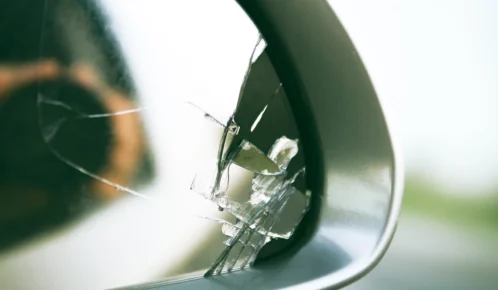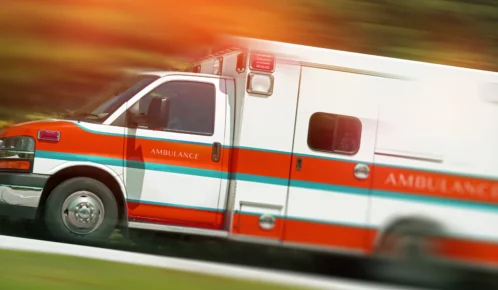If you suffered injuries in a crash in Chicago, you’re probably wondering, “What does car accident insurance cover in Illinois?” To answer your question, experienced injury lawyers will need to know more about the insurance policies available, their coverage limits, and who caused the accident.
Table of Contents

Our car accident attorneys at Ankin Law understand that there’s nothing more important than your family’s wellbeing after a crash. Contact our firm to learn more about what auto insurance pays after an accident and how to recover damages. We’re here to help you make the most of your recovery.
How Much Car Insurance Coverage Does Illinois Require?
Illinois is an at-fault state. Consequently, the driver who causes a crash must pay for the damages suffered by the accident victim. State law requires drivers to carry liability coverage of at least $25,000 for personal injury or death of one person and at least $50,000 for personal injury or death of several individuals in a single car accident. The policy must also provide at least $20,000 in liability coverage for property damage per accident.
Illinois auto insurance policies automatically include uninsured motorist (UM) and underinsured motorist (UIM) coverage for bodily injury and death. These mandatory minimums are intended to protect accident victims from financial hardship caused by medical bills and lost wages after a crash. Drivers can opt to carry additional liability coverage, but they’ll pay more in premiums.
Enforcement is done through citations and the Electronic Insurance Verification system. Additionally, drivers must carry proof of insurance to confirm that they have met mandatory auto insurance requirements.
Driving without the required car insurance coverage in Illinois can result in severe punishments, including fines and driver’s license suspension. Similarly, driving without valid proof of insurance carries up to $1,000 in fines, temporary driver’s license suspension, and at least a $100 reinstatement fee.
Optional Auto Insurance Coverages Offer More Protection
Optional car accident insurance coverages are available to Illinois drivers who wish to pay extra in premiums. Even though they aren’t required, these coverages are a good idea for people who want an additional layer of protection in the event of an accident. Common add-ons include:
Accidental Death Benefit
Accidental death benefit coverage provides a lump-sum payment to the policyholder’s beneficiaries if the insured driver is killed in a car accident. This coverage offers financial security for loved ones left behind, helping to cover funeral expenses, lost income, and other financial burdens. Illinois drivers who prioritize their family’s financial protection may find this coverage essential.
Medical Payments Coverage
Medical payments coverage, often called “MedPay,” helps cover medical expenses for you and your passengers after an accident, regardless of who was at fault. It can pay for hospital bills, surgeries, X-rays, and even funeral costs. For Illinois drivers without sufficient health insurance, MedPay can be a valuable addition to their auto insurance policy.
Comprehensive Coverage
Comprehensive car insurance coverage in Illinois protects your vehicle from damage caused by non-collision incidents like theft, vandalism, fire, natural disasters, and falling objects. For Illinois drivers who want protection beyond accidents with other vehicles, comprehensive coverage can prevent substantial out-of-pocket expenses.
Collision Coverage
Collision coverage pays for the cost of repairing or replacing your vehicle if it is damaged in an accident with another vehicle or object, regardless of fault. This is especially important for Illinois drivers with newer or high-value vehicles, as it can prevent costly repairs after an accident.
What Does Liability Car Accident Insurance Cover in Illinois?
Knowing what liability car accident insurance covers can help you understand what you can sue for in a car accident lawsuit in Illinois. The at-fault driver is responsible for covering damages and other losses suffered by car accident victims, but the driver does not usually pay this money out of pocket. Instead, the at-fault driver’s liability insurance covers the costs of personal injury to the other driver and damage to the property – up to the policy limits.
In Illinois, liability insurance is two-part coverage: bodily injury and property damage. Bodily injury liability pays for the losses and expenses stemming from the injuries caused by the car accident. They include:
- Medical Costs: This category comprises any expenses associated with treating car accident injuries. Medical costs include emergency room (ER) visits, diagnostic tests, physician fees, medication, surgery, hospital stay, physical therapy, and other treatment expenses. You may also be entitled to future medical damages if your injury will require ongoing treatment.
- Lost Earnings: The insurance company should also compensate you for wages, earnings, or profits you lost when you could not work because of your injuries. They can also cover any lost future earning capability if you cannot work or return to your pre-injury position because of your injuries.
- Pain and Suffering: noneconomic damages like pain and suffering are subjective and hard to quantify. They include the physical pain and discomfort, alongside the emotional agony, arising from your injuries or accident. Chronic physical pain, scarring, disfigurement, and psychological effects like depression and anxiety typically fall under this category.
Property damage liability, on the other hand, pays for repair or replacement costs of property damaged in the accident. Valuables damaged or destroyed in car crashes include the car, expensive cameras, phones, and even clothing.
Your UM/UIM coverage applies if you get injured in an accident caused by a driver with no insurance or inadequate insurance to pay for all your damages and losses in full. This coverage also applies to hit-and-run accidents.
The mandatory UM/UIM coverage pays for losses arising from bodily injury only. Fortunately, drivers can purchase additional UM/UIM property damage liability coverage to increase protection. This additional coverage gets incorporated into your policy as an endorsement to cover damage to your property and other valuables in an accident caused by an uninsured, underinsured, or hit-and-run driver.
How to Get Car Accident Insurance to Cover Your Losses
Illinois law allows you to pursue compensation for injuries and property damage caused by a car accident by filing a personal injury claim against the liable driver’s insurance provider. This type of claim is called a third-party insurance claim.
You have two options to initiate a third-party claim against the other driver’s insurance company. First, you can notify your own insurance company, which will, in turn, start a claim with the other driver’s insurer.
The other option is to start the third-party claim yourself. You can do that on the other driver’s insurance company’s mobile app or online portal. Alternatively, you can get the company’s contact information and request a representative to guide you on starting a third-party claim.
You will need to submit your information and details of the crash, regardless of how you initiate the claim. Your name, contact information, accident date and location, and the other driver’s name and insurance information are some pieces of information you must provide. A police report is also essential in filing a claim against the other driver’s insurer.
With that in mind, documenting the accident and exchanging information with the other motorist after a car accident is always a good practice. It is also wise to call the police. In fact, calling the police after an accident that leads to injury or death is a legal requirement in Illinois.
Cooperating with a Claims Adjuster
Upon receiving your claim, the at-fault driver’s insurer will assign an adjuster to your claim. You will need to cooperate with the adjuster to get a satisfactory outcome from your claim. You shouldn’t accept a settlement offer without getting legal advice, or keep negotiating with an adjuster who is not giving your claim the seriousness it requires.
Hiring a car accident lawyer to handle your claim at this initial stage will reduce the chances of making costly mistakes. Your lawyer will take over all correspondence and communications between you and the adjuster. The lawyer will also guide you on things to do and mistakes to avoid.
Determining Liability in a Car Accident
The other driver must be liable for the crash that caused your injuries and property damage for their car accident insurance to cover your losses. Sometimes liability is clear, and the other driver’s insurer agrees to pay the claim. An example is a rear-end crash, where the driver who fails to comply with the safe following distance requirement is usually liable. Another example is when compelling evidence against the other driver is available.
Other times, liability is unclear, and the other driver’s insurer is unwilling to pay the claim. An example is when you are partially at fault for your accident and injuries. Another example is when your accident involves multiple potentially at-fault parties. In both scenarios, an accident lawyer can establish the other driver’s liability and get you an acceptable settlement.
Proving Your Injuries and Damages
To get the auto insurance to cover your losses, you must also show that your injuries and damages are a direct consequence of the accident caused by the other driver, and that you suffered verifiable losses. You can do that by supporting your claim with your medical records, financial documentation for your lost wages or income, and other forms of evidence.
Settlement Talks
The insurance company may send you a settlement offer upon establishing that its insured driver was at fault for your accident. The first offer is usually significantly lower than the actual value of your claim. A series of settlement talks with the insurance adjuster may be necessary to get the insurance company to cover all your car accident losses.
When you hire Ankin Law to handle your claim, we’ll help you understand more about what car accident insurance covers and what it doesn’t. Our law firm will shoulder the cost of your car accident lawsuit, so you don’t need to worry about upfront fees. Most of all, we’ll help your family recover maximum compensation from the auto insurance company.



